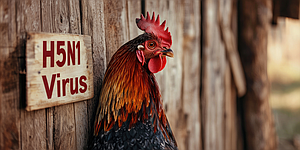5/30/2025

As the H5N1 bird flu virus quietly blazes through American pastures, infecting nearly 1,000 dairy cow herds and surfacing in more than 70 human cases, many experts believe we’ve been here before — watching a viral threat escalate as political delays pile up. But this time, the consequences may be harder to contain.
The U.S. Department of Health and Human Services (HHS) recently made headlines for canceling its vaccine development contract with Moderna, just as the bird flu continues spreading across all 50 states. For many public health experts, the alarm bells are deafening—and the silence from some quarters is devastating.
Dr. Tyler B. Evans, a world-renowned infectious disease physician who led New York City’s COVID-19 medical response and currently serves as CEO of Wellness Equity Alliance, minced no words:
“Bird flu remains a serious public health concern. Pulling back on surveillance only heightens the risk, especially for rural communities and those in direct contact with livestock.”
Dr. Evans, who’s treated patients in Ebola zones and stood at the forefront of global outbreaks, warns that the nation’s foundational public health protections are being quietly dismantled. One stark example? The decision not to test the U.S. milk supply for viral contamination—a move he calls “a broader erosion of foundational public health protections.”
How Did We Get Here?
The roots of this growing health crisis stretch back to the previous administration. In a widely criticized move, the Trump administration laid off over 100 key scientists and halted critical vaccine development—at a time when experts were urging readiness for the next pandemic.
“We are entering a dangerous era where access to basic health data is no longer guaranteed,” Evans cautioned. “It’s a reminder that health outcomes are shaped as much by political and social decisions as by pathogens themselves.”
Indeed, the dismantling of scientific infrastructure under Trump has left gaping holes in the nation’s pandemic preparedness. These gaps are now being felt not just in data systems and diagnostics, but in real-time decision-making on the ground.
A Call for Courage, Not Complacency
The Biden administration, while under fire for being slow to ramp up testing and response, still has a chance to change course—if it listens to experts like Dr. Evans and restores funding and transparency.
Evans, also an adjunct professor at USC’s Keck School of Medicine and author of the forthcoming book Pandemics, Poverty, and Politics, stresses the need for vigilance, particularly as viruses jump from animals to humans with increasing frequency.
“This is not the time to relax. Zoonotic threats like H5N1 demand real-time monitoring, robust testing, and urgent communication,” he emphasized.
What's At Stake for Houston and Beyond?
For Houston’s diverse communities—particularly our rural workers, dairy industry employees, and underserved residents—the risks of inaction are stark. As the virus moves from animals into human populations, the need for clear public health leadership has never been greater.
Dr. Evans's organization, the Wellness Equity Alliance, is already pushing solutions: restoring surveillance, expanding access to accurate data, and reinforcing community trust in science-based interventions. His record of service spans continents—from West African Ebola wards to U.S. city hospitals—and he’s urging Houston to lead with compassion and courage.
The Path Forward
Houston Style Magazine readers, one of America’s most resilient cities, understands the price of delayed response. Let this be our moment to demand truth, transparency, and timely action—not partisan politics. Because when a virus strikes, it doesn’t care which administration is in charge. But our response—swift, science-based, and rooted in equity—can determine whether we contain a crisis or become consumed by it.
